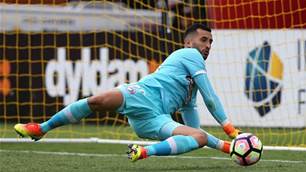SYDNEY lawyer and former Matildas player, Moya Dodd, is Australia’s first representative on football’s world governing body.
Co-opted for a year in May, Dodd is one of just three women on the FIFA ExCo. She continues to serve as Vice President of the Asian Football Confederation, heads up the AFC Women’s Committee and, if time permits, likes to line up for a game on weekends.
au.fourfourtwo.com asked her about the challenges facing the women’s game globally and at home.
How much has the women’s game changed since you were playing at the elite level?
For a start I didn’t play professionally. That’s one of the differences now days; we’ve made the first steps towards professionalism. I think the playing standards have increased because girls are taking up the game when they’re younger and, through the national curriculum, they’re getting coached better from an early age.
The next challenge is keeping players in the game. When I played I was holding down a full time job as well as playing. You’d get up in the morning, work all day and then rush out of the office earlier than your peers so you could dash off to training. Then it was back home maybe by 10 at night, eat dinner, go to bed and get up the next day and do it all over again. It was exhausting. Even now there are very few women players who are full time professionals.
By the time women hit 24-25, they must be wondering how much longer they can keep up that pace. So I think retaining players in what should be the best five years of their playing lives, from 25 to 30, is the next real challenge. You have to ask if, for example, Rio Ferdinand worked in a shoe stop until five and then went to training in the evening, how good would he be?
It will be transformational once we get to the point where women can move into full time professional careers. Where they train for a few hours a day, rest properly – which is something our elite women don’t often get a chance to do – and then play top level matches.
W-League side Canberra United stirred up a hornet’s nest last season by demanding more professionalism from players who weren’t receiving a professional wage. Where did you stand on that?
It’s about understanding what professionalism means. It’s a state of mind, but it also costs time and money to be professional. One of the players said we’re professionals everywhere but at the ATM. Clubs and national teams have a right to expect players to be there for the football program. To what extent you let players trade-off their training sessions against their work requirements is the dilemma that all coaches face. As the W-League becomes more professional then those demands become greater and tough choices have to be made. It’s a difficult road, but we’re a lot further along it than when I played and we had to pay our own airfares to play for Australia. Once we had to sew the national crests onto our own tracksuits.
The Libya women’s team have faced threats from radicals and were recently banned from taking part in a major tournament in Germany. Do you know much about that case?
I don’t know any more than what I’ve read in the press. But there’s been other cases reported in Nigeria recently of players not getting paid and resorting to prostitution. I know in Saudi Arabia where there’s no official women’s football program, women play behind closed doors. There’s a long way to go in so many places to allow women any access to the game. And then, once women are able to play, to allow them to play on an equal footing with their male peers. I have to say Australia’s one of the best places in the world to be woman and to be a woman footballer although we’ve got plenty of work to do here too.
Along with FIFA's vice-president Prince Ali bin al-Hussein of Jordan you helped overturn the ban on Muslim players wearing the hijab. How did you get involved in that campaign?
I became aware of it originally by reading about it. There was a case where a (London) Olympic qualifier between Iran and Jordan couldn’t be played because the entire Iranian team was wearing headscarves. I should also add there were three Jordanian players who also had headscarves and weren’t permitted to play. So when we have an Olympic qualifiers being decided by a rule like this in Asia I felt compelled to get involved. It was also important to show there were new designs of sports headscarves with either velcro or magnets that would come apart if pulled so that there was no risk of injury.
Have you received any feedback or spoken with any female players who have indicated the difference that FIFA rule change made in their lives?
Absolutely. The Facebook page had 65,000 likes. Even in Australia there were women who had not been prevented from playing at participation level in Australia – because referees had sensibly looked at their equipment and decided it wasn’t dangerous – but who, if they were good enough to make the Matildas, were never going to be able to play in a FIFA or Olympic match. There are 650 million Muslim women in the world and to be able to restore the dream of participation at the elite level was very powerful.
Are you seeing progress on the coaching front? Canberra United appointed Liesbeth Migchelsen to follow in the footsteps of Jitka Klimkova and Hesterine de Reus has taken over the Matildas.
First of all I think it’s important to say that both coaches have been appointed on merit. As a player you want to have the best coach who’s going to teach you the most. You don’t want anyone appointed for any other reason than they’re going to be best for the team. The question is whether there are sufficient opportunities for recognition of female coaches so they can be pressing for those top jobs. I think we have some way to go to get to a point.
I look around the world and I see, particularly in Europe, that there are a lot of women about my vintage who have gone from being international players to being high-level coaches, many of them with pro licences. You have to ask yourself why that hasn’t been particularly the case in Australia. We are making progress, though. I think there are some good young female coaches coming through. The critical thing of course is that you have the jobs to go into. To have elite coaches you need elite competitions so it’s a progressive development on all fronts.
Is there any reason why women can’t coach male teams?
You have to ask the people who appoint the coaches to male teams. I know of one former Italian team player Carolina Morace who coached a men’s team in the third division in Italy, which is remarkable actually. She’s a Pro Licence coach and a former national team coach of the Italian women’s team, coached the Canadian women’s team and she’s coached men’s football, but I don’t know of too many others. I think coming from a world where people barely participated as players it’s obviously going to take a while before we’re participating fully as coaches. My hope is that in a few years time we’ll be seeing a good pipeline of female coaches coming through in Australia.
As vice-president of the AFC, how does the confederation stack up in terms of supporting women’s access to the game?
We’re a very diverse confederation. It’s enormous geographically and it’s enormous in terms of its cultural complexity. In that sense it’s a nice challenge. We were the first confederation to create positions for women on the executive committee. Four of the 24 members of the AFC executive committee are women. I think the only other confederation at this point to have a position for females is UEFA and they have one. So we have inclusion at that level and, to be honest, I think that’s the only reason I’m on the AFC executive committee. Had they not created positions for women I doubt whether I would be there. I think football has recognised that if you were to wait for women to find their way through the layers of governance in an organic fashion then it would take a very long time. So some of these types of initiatives they have in Asia and now in FIFA I think are very positive. But they’re a first rather than a last step.
In terms of the women’s game what gives you most cause for optimism?
I think seeing fantastic women players coming through and being well coached. That, to me, means our product is going to continue improving. That will result in greater support, greater revenue, greater professionalism and more funds going back into development. I also think it will generate more future leaders in the game – passionate players who will continue to support the game after they’ve hung up their boots.
Do you foreshadow a day when women no longer have to be footballing trailblazers; they can just be players, administrators, coaches and fans?
It would be nice to get to the stage where it’s not unusual to have a woman on the FIFA executive committee or coaching a national team; where the participation of women is normalised throughout the game. I’d like to think it would happen in my life time. I plan to live a long time.
Related Articles

Socceroo-in-waiting seals Championship deal

Fringe Socceroo swerves A-League to remain in Europe after Fulham exit













